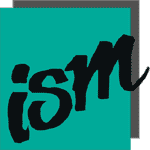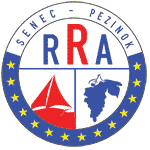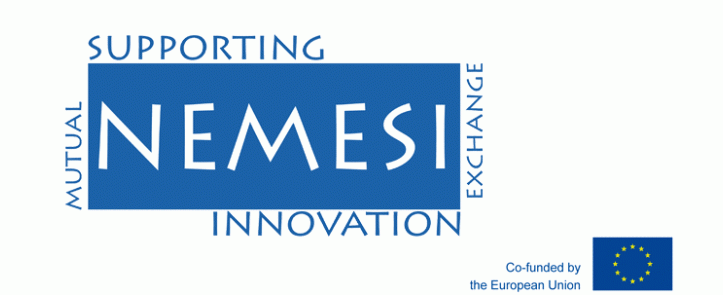www.nemesi-project.eu
26/03/2015 – L’IRFI ha presentato a Bruxelles i risultati del Progetto Nemesi ed il ruolo degli organismi intermediari al Seminario di Formazione transnazionale “Connecting European Chambers: Sharing lessons learned and new challanges from EU Programmes”, tenutosi presso Il Comitato Economico e Sociale. Più di 100 i partecipanti, rappresentanti delle Camere di Commercio di Commercio e delle Unioni Regionali e Nazionali dei seguenti Paesi: Austria, Francia, Germania, Italia, Olanda e Spagna.
29/01/2015 – L’IRFI interviene alla trasmissione “Ho scelto Cusano” dell’Università Telematica Niccolò Cusano spiegando il Progetto Nemesi. Ascolta l’intervista
3/12/2014 – Conclusione del Progetto Nemesi: On line la guida elettronica e le strategie di intervento per l’identificazione dei fabbisogni e il matching di competenze nei settori Green economy e Ict
Entrambi i documenti sono consultabili al seguente link www.nemesi-project.eu/downloads
La banca dati delle Best practice raccolte e valutate durante il progetto è disponibile al link http://nemesi-project.eu/best-practice-en/
14/11/2014 – Project NeMESI 4th European Workshop and final conference – Unlocking financial and non financial means to improve skills need identification and skills matching
NEMESI PROJECT
The NEMESI project was launched on December 2013 and is supported by the Employment, Social Affairs and Inclusion DG of the EU Commission in the frame of the former PROGRESS programme (Call VP/2012/009).
Globally, managing talent is rated top priority for business but SME, in particular small enterprises, don’t have HR departments or the experience and expertise to manage the process of recruiting and HR development or develop partnership to manage their gap.
The task assumed by NeMESI is to promote policy learning and transfer processes across Europe in identified policy areas: identification of skill needs through effective collaboration between sectors and improvement of the matching of skill supply and demand for the benefit of SMEs in the ICT sector and in the green economy.
Such processes encompass quality and effectiveness improvement of regional policies through active trans-regional cooperation around Europe. Moreover they support mutual learning on innovative policy measures and practices and their transfer into other regional systems, where feasible.
This is made possible due to the operation of a participatory action driven research worked out by project partners, the organization of 4 national EAWS workshops, 4 EU workshops, an open space conference, website and online device with a database with information on good practices and an ad hoc search engine; hands on e-guide for SMEs and social media campaign.
THE PARTNERS

IRFI: Istituto Romano per la Formazione Imprenditoriale – Camera di Commercio di Roma, Rome, ITALY
IRFI is the designated training agency of the Rome Chamber of Commerce and acts in compliance with its institutional mandate given by the Chamber of Commerce itself. Its main activities are research, consultancy, development and management of training activities.
Typical assignments include delivery of tailored training and support services for the following fields of expertise: SME development and entrepreneurship development; adult learning and links with the labour market; training needs assessment and human resource development through innovative training programmes for owners, managers, consultants, and jobseekers and formulation and delivery of tailored training initiatives for meeting the skills demand in growing sectors.
IRFI works actively with national, and foreign institutions (Ministry of Internal Affairs, OIM, etc.), universities and research centers (Sapienza University of Rome, National Council of Researches, etc.), local and regional authorities, social partners and business associations, companies of different size.

CREA – Confederación de Empresarios de Aragón, Zaragoza, SPAIN
CREA is the most representative employers federation in the northern region of Aragon, Spain is a non-profit organization with a significant impact at regional and national level.
CREA represents more than 30.000 enterprises through its associates made up by territorial and multi-sectorial businesses associations as well as biggest local companies operating in the region; offering a wide range of services to our associates and other targets.
Main activities are focused on:
- Training & employment services and guidance to different targets.
- Labour advice and insertion
- Environment advice
- Health and safety measures for companies
- Economical Department
- Promotion of international trade. Enterprise Europe Network. Development of European
Contact: Mrs. Olivia Del Amo – odelamo@crea.es
Find us: www.crea.es

ISM – Institute for Social Pedagogic Research Mainz., Mainz, GERMANY
ISM provides consultancy for public authorities, NGOs and enterprises; project development and management; evaluation; statistical inquiries; social research; social planning; trainings; local and international networking; quality management.
Since 2005 ISM is responsible for a nationwide network of researchers and professionals to support ethnic minority business. ISM has a annual cash flow of about 3m € and has a staff of 25 fulltime researchers, 5 clerks, and some freelancers.
Since summer 2011 ism is in charge of a specialist department, financed by the Federal Ministry of Social and Labour Affairs, in order to foster ethnic entrepreneurship in Germany: to train professionals of public and private institutions and to develop new tools and instruments to support ethnic entrepreneurs.
Its main fields of intervention are: labour market policy, social policy, evaluation, business creation, vocational training, youth welfare, education, migration, quality management, diversity management.
Contact: Dr. Ralf Sänger – ralf.saenger@ism-mainz.de
Find us: www.ism-mainz.de

RDA – Regional Development Agency Senec-Pezinok, Senec, SLOVAKIA
RDA is a public organization belonging to Slovak integrated network of RDAs. It operates on the territory of Bratislava region and cooperates with public, SME’s and NGO sectors in Bratislava and similar bodies from EU and third countries. Main activities relate to VET in the LLL context, consultancy and support service for elaboration of socio-economic strategies, project management and tailor-made VET trainings. Focus is put on VET, community development, partnership, empowerment of stakeholders, VET valorization in SME’s, decision-makers, VET schools, as well as SME associations, chambers, social partners. RDA is a nationally accredited institution in the VET area and management of European Projects. The accreditation includes 12 complex VET programs for SME and public sector RDA provides guidance to beginners in business and start-up activities and has outstanding experience in dissemination and exploitation of VET results.
Contact: Mrs. Jana Abraham – jabraham@rrasenec-pezinok.sk
Find us: www.rrasenec-pezinok.sk
THE AIMS
NeMESI aims to find new ways to establish dialogue and mutual learning between SMEs, policy and decision makers, training organisations, PES, and other stakeholders in identification of skills needs and skill matching for the benefit of SMEs in the digital and green economy. NeMESI achieves it through workpages aimed at:
- promoting bottom-up development of concepts (processes and structure) of cross sectorial engagement in skills needs identification and skills matching;
- investigating current processes and structures of stakeholders cooperation in the and the role of different actors;
- developing stakeholder engagement programs both at national and European levels,
- stimulate the adoption of concrete initiatives of stakeholder cooperation in skills needs identification and skills matching in the digital and green economy by developing:
- hands on e-guide for SMEs that draws insights from various workshops;
- free access website and online device with a database with information on good practices and an ad hoc search engine;
- improving the methodology implemented in the project through its evaluation in relation to its objectives and expected impacts;
- keeping the target audience and wider audience informed regarding the advances of the project by continuously disseminating relevant information using various communication tools and channels, included social media.
This project is supported by the European Union Programme for Employment and Social Solidarity – PROGRESS (2007-2013).
This programme is implemented by the European Commission. It was established to financially support the implementation of the objectives of the European Union in the employment, social affairs and equal opportunities area, and thereby contribute to the achievement of the Europe 2020 Strategy goals in these fields.
The seven-year Programme targets all stakeholders who can help shape the development of appropriate and effective employment and social legislation and policies, across the EU-27, EFTA-EEA and EU candidate and pre-candidate countries.
The information contained in this publication does not necessarily reflect the position or opinion of the European Commission.
